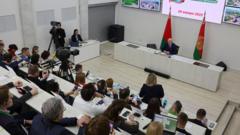Lukashenko's critics have condemned the elections, calling them a "sham." The backdrop of his presidency has been marred by violent crackdowns on protestors following the disputed election results in 2020, leading to the imprisonment of many dissenters and political adversaries. In response to persistent inquiries regarding the political prisoners in Belarus, Lukashenko deflected responsibility, attributing their imprisonment to violations of the law. "Prison is for people who have opened their mouths too wide and broken the law," he stated, reinforcing a narrative that opposition actions justified legal repercussions.
During the press conference, which lasted over four hours, Lukashenko highlighted the presence of other candidates on the ballot, characterizing their participation as legitimate despite widespread dissent. However, critics argue that these candidates function more as "spoilers," aligned with the regime rather than presenting credible challenges to his authority. The EU's foreign policy chief has explicitly denounced the election as a "blatant affront to democracy," yet Lukashenko remained indifferent to such critiques.
Despite significant international scrutiny and opposition from within Belarus, Lukashenko emphasized that the acceptance of the election results by his nation’s citizens is of paramount importance to him, largely disregarding external opinions. "I couldn't care less whether you recognise our election or whether you don't," he asserted.
As Belarus navigates its political landscape, the implications of Lukashenko's assertions resonate beyond its borders, casting a spotlight on the struggle for democratic values against authoritarian governance in Eastern Europe.
During the press conference, which lasted over four hours, Lukashenko highlighted the presence of other candidates on the ballot, characterizing their participation as legitimate despite widespread dissent. However, critics argue that these candidates function more as "spoilers," aligned with the regime rather than presenting credible challenges to his authority. The EU's foreign policy chief has explicitly denounced the election as a "blatant affront to democracy," yet Lukashenko remained indifferent to such critiques.
Despite significant international scrutiny and opposition from within Belarus, Lukashenko emphasized that the acceptance of the election results by his nation’s citizens is of paramount importance to him, largely disregarding external opinions. "I couldn't care less whether you recognise our election or whether you don't," he asserted.
As Belarus navigates its political landscape, the implications of Lukashenko's assertions resonate beyond its borders, casting a spotlight on the struggle for democratic values against authoritarian governance in Eastern Europe.


















